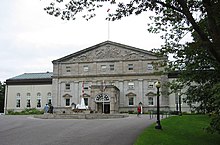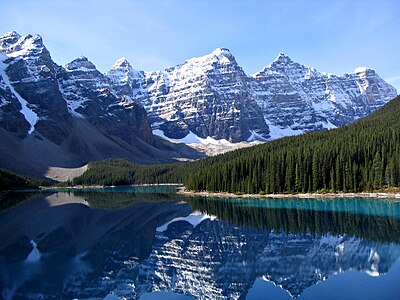Portal:Canada
| Showcase | Contents | Contributing |
Introduction
Canada is a country in North America. Its ten provinces and three territories extend from the Atlantic Ocean to the Pacific Ocean and northward into the Arctic Ocean, making it the world's second-largest country by total area, with the world's longest coastline. Its border with the United States is the world's longest international land border. The country is characterized by a wide range of both meteorologic and geological regions. With a population of just over 41 million people, it has widely varying population densities, with the majority residing in urban areas and large areas of the country being sparsely populated. Canada's capital is Ottawa and its three largest metropolitan areas are Toronto, Montreal, and Vancouver.
Canada is a parliamentary democracy and a constitutional monarchy in the Westminster tradition. The country's head of government is the prime minister, who holds office by virtue of their ability to command the confidence of the elected House of Commons and is appointed by the governor general, representing the monarch of Canada, the ceremonial head of state. The country is a Commonwealth realm and is officially bilingual (English and French) in the federal jurisdiction. It is very highly ranked in international measurements of government transparency, quality of life, economic competitiveness, innovation, education and human rights. It is one of the world's most ethnically diverse and multicultural nations, the product of large-scale immigration. Canada's long and complex relationship with the United States has had a significant impact on its history, economy, and culture.
A developed country, Canada has a high nominal per capita income globally and its advanced economy ranks among the largest in the world, relying chiefly upon its abundant natural resources and well-developed international trade networks. Recognized as a middle power, Canada's strong support for multilateralism and internationalism has been closely related to its foreign relations policies of peacekeeping and aid for developing countries. Canada is part of multiple international organizations and forums. (Full article...)
Featured article -
The Illecillewaet Glacier /ˌɪləˈsɪləwət/ is a glacier in British Columbia, Canada. It is located inside Glacier National Park in the Selkirk Mountains, a sub-range of the Columbia Mountains. After the construction of the Canadian Pacific Railway (CPR) near the glacier's terminus, and the building of a hotel nearby, the glacier became a prominent tourist destination in the Canadian west. Easily accessible by road and railway, it is one of the most-studied glaciers in North America. Its retreat over the last one hundred years has been extensively documented. (Full article...)
Featured biography -
Rachel Anne McAdams (born November 17, 1978) is a Canadian actress. After graduating from a theatre degree program at York University in 2001, she worked in Canadian television and film productions, such as the drama film Perfect Pie (2002), for which she received a Genie Award nomination, the comedy film My Name Is Tanino (2002), and the comedy series Slings & Arrows (2003–2005), for which she won a Gemini Award. (Full article...)
National symbol -
Canadian heraldry is the cultural tradition and style of coats of arms and other heraldic achievements in both modern and historic Canada. It includes national, provincial, and civic arms, noble and personal arms, ecclesiastical heraldry, heraldic displays as corporate logos, and Canadian blazonry. (Full article...)
Selected vital article -
The Canadian Heraldic Authority (CHA; French: Autorité héraldique du Canada) is part of the Canadian honours system under the Canadian monarch, whose authority is exercised by the Governor General of Canada. The authority is responsible for the creation and granting of new coats of arms (armorial bearings), flags, and badges for Canadian citizens, government agencies, municipal, civic and other corporate bodies. The authority also registers existing armorial bearings granted by other recognized heraldic authorities, approves military badges, flags, and other insignia of the Canadian Forces, and provides information on heraldic practices. It is well known for its innovative designs, many incorporating First Nations symbolism. (Full article...)
Selected picture -
Current events
- November 15, 2024 –
- The Canadian Union of Postal Workers go on strike after failing to renegotiate their contract with Canada Post. (AP)
- October 25, 2024 –
- A man fatally shoots two of his family members before killing himself in Huntsville, Ontario, Canada. (CTV News Barrie)
- Ontario Premier Doug Ford's government announces that Ontario is planning to ban international students from medical schools in the province beginning in 2026. (Pelham Today)
- October 24, 2024 –
- Four people are killed and one other is seriously injured when a Tesla car crashes into a guardrail and struck a concrete pillar at high speed after losing control causing a fire in Toronto, Canada. (CTV News Toronto)
- October 15, 2024 –
- The Palestinian Prisoner Solidarity Network is designated as a terrorist group by the Canadian government and is sanctioned by the U.S. government, due to the group's alleged ties to the Popular Front for the Liberation of Palestine. (CTV News)
- October 10, 2024 – Russian invasion of Ukraine
- The World Bank approves a new financial intermediary fund consisting of grants from the United States, Japan, Canada, and other countries coupled with interest from frozen Russian assets to give to Ukraine as part of a $50 billion loan. (Reuters)
Did you know -

- ... that Annalee Newitz chose to set their debut novel Autonomous in the Canadian prairies because it was "the kind of place that often gets forgotten"?
- ... that Joe Wirkkunen coached the Finland men's national ice hockey team after receiving a recommendation from Canada?
- ... that after it bombed in Canada, John Richardson removed anti-American passages from The Canadian Brothers to publish it in New York?
- ... that before the House of Commons of Canada considers a taxation or spending bill, a royal recommendation has to be given by the governor general?
- ... that Jonathan Beaulieu-Richard retired from the Canadian Football League to become a pharmacist?
- ... that the Oxtongue River, historically a canoe route for indigenous people, is still used for recreational canoeing?
- ... that while seeking funding for The Clarion, Carrie Best was told by a donor: "You are just a small voice crying in the wilderness – but keep on crying"?
Featured list -
The Lionel Conacher Award is an annual award given to Canada's male athlete of the year. The sports writers of the Canadian Press (CP) first conducted a poll to determine the nation's top athlete, of either gender, in 1932. Separate polls for the best male and female athletes were conducted beginning the following year. The CP formalized the poll into an award in 1978, presenting their winner a plaque. It was named after Lionel Conacher, a multi-sport champion whom the news organization had named its top athlete of the half-century in 1950. The award is separate from the Northern Star Award, in which a select panel of sports writers vote for their top overall athlete. (Full article...)
Main articles
Associated Wikimedia
The following Wikimedia Foundation sister projects provide more on this subject:
-
Commons
Free media repository -
Wikibooks
Free textbooks and manuals -
Wikidata
Free knowledge base -
Wikinews
Free-content news -
Wikiquote
Collection of quotations -
Wikisource
Free-content library -
Wikiversity
Free learning tools -
Wikivoyage
Free travel guide -
Wiktionary
Dictionary and thesaurus

































